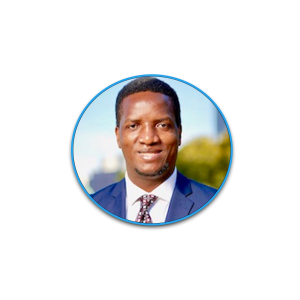Q1: Why are you an advocate for using analytics to drive better climate change outcomes?

James Hunt, AgTech and sustainability specialist: Analytics is playing a critical role in supporting the efforts by so many across agriculture to show leadership in support of environmental progress. From growing plants to producing and providing food on our plates, the opportunity for meeting goals and showing results can be unleashed through the smart use of advanced analytics.
I have seen and helped build systems that use analytics to produce more food with fewer resources by observing and truthfully reporting on the environmental conditions that foster living systems, such as crop production, and helping to inform and guide the efforts of so many, working together, to address these crucial topics.

Joe Nyangon, advises U.S. energy and utility companies on how to navigate the transition to increased sustainability: Identifying and managing rising physical climate risk and transition risk in key industries like energy, utilities, manufacturing, insurance, banking, agriculture and the public sector requires advanced analytics.
Those asset-intensive industries expend considerable capital in insurance premiums to tackle the threat of their assets becoming stranded. Particularly, the energy sector faces key challenges, including years of lagging investment in infrastructure modernization, aging infrastructure, energy efficiency gap, diversifying energy generation assets and optimal deployment of expensive assets, which makes it more susceptible to climate-driven risks. Without analytics, it would be difficult to identify, plan, mitigate and manage these risks.

Naeem Siddiqi, credit risk expert, responsible for climate risk solutions at SAS: I’ve been involved in risk management for a long time. I’ve seen the use of alternative data, micro-lending and better models provide access to credit to millions of unbanked around the world.
Analytics can make lives better – beyond simply being a source of employment and profit. Identifying and managing climate risk via analytics is going to help maintain the stability of the banking system, enable banks to develop new products and help drive better decisions.

Brecht Seifi, combines technical and EU sustainability policy expertise to help customers implement machine learning & AI cloud initiatives: I like the way analytics can reveal insights out of data that can speak for themselves. As an accurate response to climate change we need well-considered and targeted decisions. advanced analytics can help us to expand our toolbox to ensure climate resilience.
Besides revealing insights that are backward-looking, we also can simulate different scenarios in the future and act accordingly. Doing this buys us crucial time to learn and intervene when necessary.

Jerry Williams, Chief Environmental Officer at SAS, is responsible for identifying and managing climate change issues and helping to ensure SAS incorporates environmental responsibility across company operations: We use SAS solutions to help manage our Environmental Program and know from experience how powerful access to data and the use of analytic solutions can be for mitigating environmental impact.
We’ve had tremendous success in making our buildings and data centers more efficient and our smart campus initiatives are helping us to develop models and processes that reduce operational costs, make smarter investments and be more proactive with how we manage operations. Using energy more efficiently is helping us with our 2050 net-zero commitment and significantly reducing operational spending.

